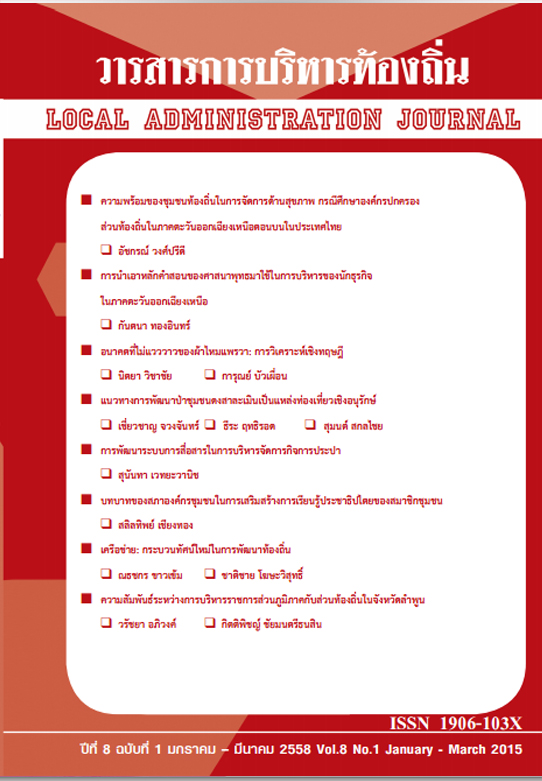การนำเอาหลักคำสอนของศาสนาพุทธมาใช้ในการบริหารของนักธุรกิจในภาคตะวันออกเฉียงเหนือ
Keywords:
การบริหารงาน, นักธุรกิจ, หลักคำสอนพุทธศาสนา, Administration, Business, an Application of BuddhistAbstract
บทความนี้เสนอผลวิเคราะห์ว่า นักธุรกิจในภาคตะวันออกเฉียงเหนือได้นำเอาหลักคำสอนในพุทธศาสนามาใช้ในการบริหารธุรกิจของตนเองอย่างไร กลุ่มตัวอย่างที่ใช้ในการศึกษา ได้ถูกคัดเลือกมาอย่างเฉพาะเจาะจงจากนักธุรกิจที่ได้นำหลักคำสอนทางพุทธศาสนามาประกอบธุรกิจในจังหวัดอุบลราชธานี จังหวัดศรีสะเกษ จังหวัดอุดรธานี จังหวัดนครราชสีมา และจังหวัดขอนแก่น เป็นจำนวน 17 บริษัท ผู้วิจัยเก็บข้อมูลโดยวิธีการสัมภาษณ์เชิงลึก (In-depth Interview) และการสังเกตอย่างไม่มีส่วนร่วมในวิธีการบริหารธุรกิจของนักธุรกิจที่คัดเลือกมา
ผลการวิจัยพบว่า การนำเอาหลักคำสอนของพุทธศาสนามาใช้เป็นแนวทางในการการบริหาร จัดการเชิงกลยุทธ์ตามกรอบแนวคิดของนักธุรกิจที่ศึกษานี้นี้มีความสอดคล้องกับแนวคิดของ Balanced Scorecard ใน 4 มิติ ดังนี้1) มิติด้านลูกค้า (Customer Perspective) ฆราวาสธรรม 4 อิทธิบาท 4 สังคหวัตถุ 4 และทศพิธราชธรรม 2) มิติด้านกระบวนการภายใน (Internal Process Perspective) นักธุรกิจใช้หลักคำสอนทางพุทธศาสนามาประยุกต์ใช้ คือ ฆราวาสธรรม 4 พรหมวิหาร 4 และอิทธิบาท 4 3) มิติด้านการเงิน (Financial Perspective) นักธุรกิจใช้หลักคำสอนทางพุทธศาสนา ฆราวาสธรรม 4 มาประยุกใช้ และ 4) มิติด้านการเรียนรู้และพัฒนา (Learning and Growth Perspective) นักธุรกิจใช้หลักคำสอนทางพุทธศาสนามาประยุกต์ใช้ คือ ฆราวาสธรรม 4 จักรธรรม 4 ทิฏฐธัมมิกัตถประโยชน์ 4 และกัลยาณมิตร 7
An Application of Buddhist Principles in the Business Administration by the Business Executives in Northeastern Thailand
The study documents how 17 selected business executives have used Buddhist teachings in the running of their own business firms. These executives, representing 17 companies, were from the provinces of Ubon Ratchathani, Sisaket, Udon Thani, Nakhon Ratchasima and Khon Kaen. The data used in this study were collected through in-depth interviews and close, non-participative observation.
It was found that the ways these business executives managed their companies resembled strategic management under the concept of Balanced Score Card, covering all 4 dimensions: 1) Customer Perspective through the Lord Buddha’s teaching about four guidelines to treat and please people, four foundations of success or accomplishment, and ten rules for the rulers; 2) Internal Process, as was seen in the way these executives observed the four rules to interact and treat lay people, four divine rules and four foundations of success or accomplishment; 3) Financial Perspective, the business executives had applied the principles of four rules for the lay people; and 4) Learning and Growth Perspective, the business executives had applied the principles of four rules for the lay people, four wheels of doctrine, four rules of the present gains or benefits, and seven rules of being with good friends.
Downloads
Published
How to Cite
Issue
Section
License
The copyright of all articles published in the Local Administration Journalis owned by the College of Local Administration, Khon Kaen University.



